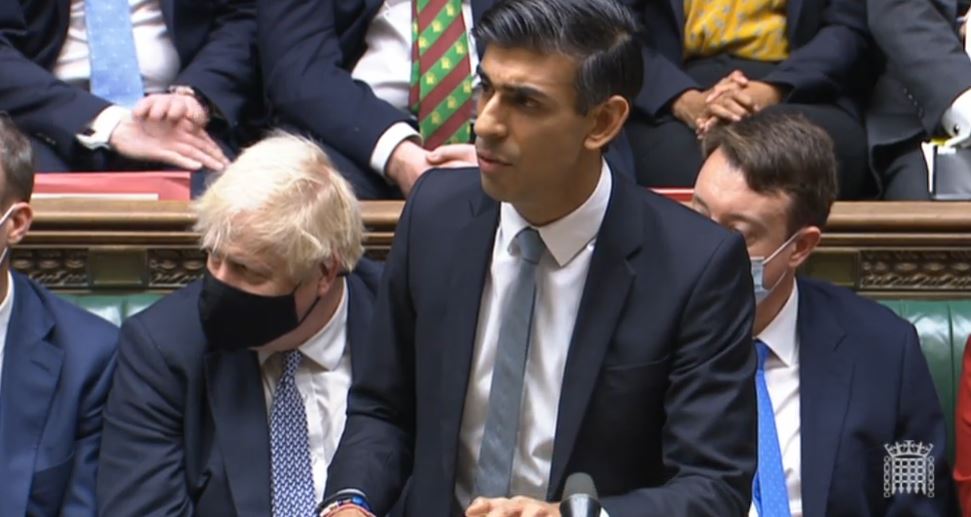Next Wednesday around midday, the Chancellor Rishi Sunak will deliver a financial health check on the state of the UK’s economy and finances. This ‘mini Budget’ does not normally change key fundamentals on tax and spending. That normally comes in October of each year in the actual Budget.
However, Sunak’s statement comes on the eve of the cost-of-living crisis, when a tsunami of increases will batter household finances.
To recap the misery: a national insurance hike next month will cost the average worker £250 per year. Energy bills will increase 54% with a further increase due in October. Fuel levels at the pumps are already depressing motorists. Council tax increases will start too. Higher mortgage payments are now a reality for those on variable rates. More increases on that front are due later in the year. And inflation will hit 7% as the weekly shop just gets more expensive.
Of all the kicks, it is the rise in energy bills that is the most painful. The relief measures already introduced by the government are simply inadequate to avoid an explosion in fuel poverty and define a whole swathe of the population about to become the new poor.
 iStock
iStockMinisters have pledged a £200 helping hand on bills, although it has to be paid back by consumers over five years in what amounts to an interest-free loan. And council tax payers in Bands A-D will get help to the tune of £150 per year. Local decisions to increase the tax will, however, swallow a good deal of that help.
The Institute for Fiscal Studies (IFS) estimates that the measures announced so far only deals with about a fifth of the increases households face in the wake of higher energy prices following Russia’s invasion of Ukraine.
With inflation running riot, wage increases agreed for 2022 now mean that there is a real-terms cut in the standard of living of most households, since higher wage packet hikes for this year are well below the current inflation rate. Pensioners are in the same boat as the Chancellor binned the operation of the ‘triple lock’ for this year.
Of all the groups who will be looking on in horror, it is citizens who rely solely on state benefits. It is stating the obvious to say that most will simply be unable to afford the energy price hike. You cannot pay what you don’t have. Indebtedness to energy companies is set to rocket and some consumers will rack up arrears that will take years to pay off, assuming they can pay them off at all.
Next Wednesday’s statement can’t be a business-as-usual update. In fact, what the Chancellor has to deliver is a full budget to recognise and deal with the oncoming grief. If nothing is done, fuel poverty will spiral to levels that should sicken a so-called civilised society. What does Rishi Sunak intend to do to help those on benefits who want to pay their bills but can’t?
Focusing minds has been made harder by the fact that the crisis is still largely theoretical, its full impact will not kick in until next month. As households radically adjust spending plans to cut out ‘unnecessary’ expenditure, I would fear for the hospitality sector who will feel the downside of consumers reordering spending priorities. And that is on top of the horror of Covid, which has left this sector reeling.
In order to squeeze inflation out of the system, there will be further increases to interest rates. But the monetary policy committee of the Bank of England has to be careful, as squeezed household expenditure is likely to dampen demand and push up unemployment in certain sectors. Moving too radically, too quickly on rate increases, could tip the economy into a vicious circle of higher unemployment and eventual recession.
The Chancellor’s room for manoeuvre has been restricted by his joint declaration with the Prime Minister that the national insurance increase will go ahead. It would have been prudent, and indeed the correct course of action, to delay the rise until the white heat of this crisis passes. The pleas of countless Conservative MPs to do just that has fallen on deaf ears.
 iStock
iStockThe Tories are now in the unenviable position of being a government that is taking more in taxes than any other in the living memory of a lot of voters. The right-wing commentariat can barely conceal their contempt for Sunak and Johnson, seeing them as big on state intervention and spending, and traitors to the holy grail of low taxation and light regulation.
If low taxation is an article of faith, then it is beyond dispute that the Chancellor is failing. On top of the manifesto-breaking national insurance increase, we also have the four-year freeze on tax allowances.
That measure will drag more people into paying tax for the first time and push others into the higher band. For just about everyone, it is a stealth tax that will erode spending power and mean workers keep less of what they earn.
The management of this crisis will determine the fate of the government. Some bold thinking is required and as early as next Wednesday. If the action leaves millions stranded, this crisis could erupt into the kind of anger not seen since the days of opposition to the poll tax. The inability to deal with that finished Margaret Thatcher.
Johnson and Sunak should beware the ghost of Thatcher. The political morality tale suggests a failure to deal with unpopular taxes spells electoral suicide for a party that trumpets low taxes and yet delivers the exact opposite.
Follow STV News on WhatsApp
Scan the QR code on your mobile device for all the latest news from around the country


 Parliament TV
Parliament TV

























